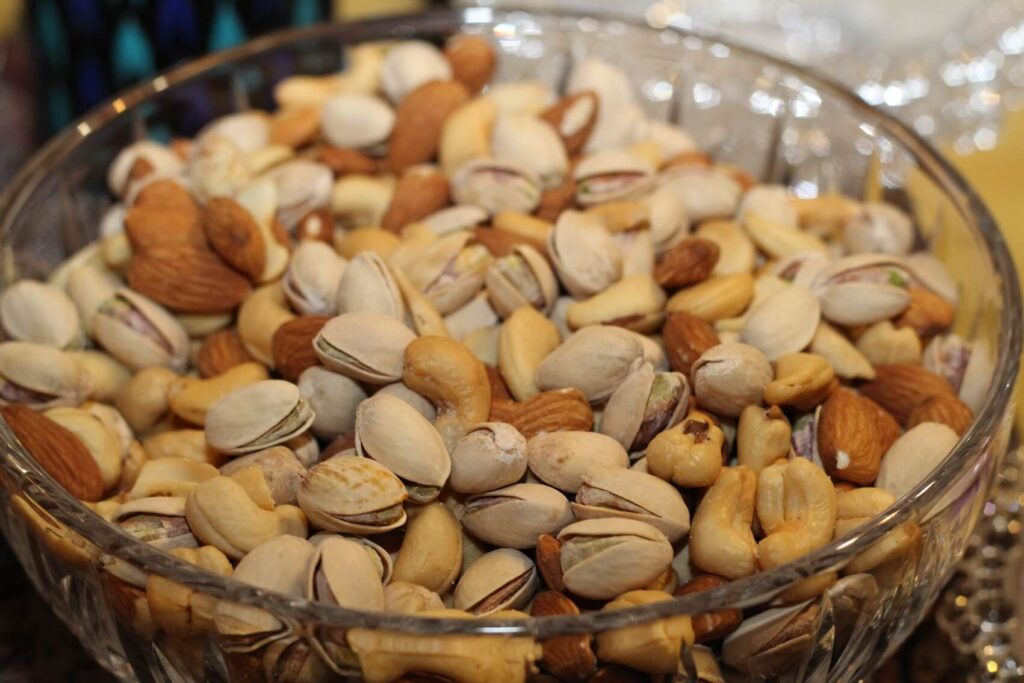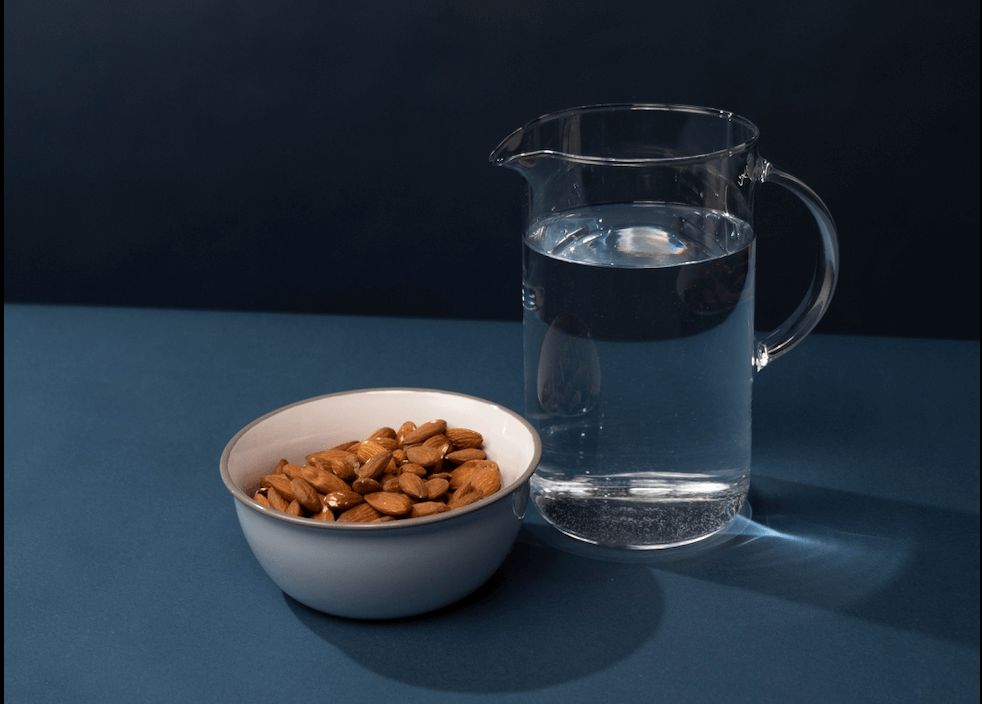Soaking seeds overnight is a time-honored practice with roots in traditional wisdom and a plethora of reported health benefits. As we embark on this journey, we’ll explore the science behind soaking seeds and unveil the wealth of advantages it brings to the table. This comprehensive guide aims to provide you with an in-depth understanding of why soaking seeds is not just a culinary technique but a transformative step towards a healthier lifestyle.
The Science behind soaking nuts overnight
Soaking seeds initiates the germination process by breaking down enzyme inhibitors and phytic acid. This natural activation enhances nutrient absorption and makes seeds more digestible. Additionally, soaking nuts is a practice rooted in the idea of enhancing their nutritional profile and digestibility. Let’s delve into more details.
Nutrient enhancement
- Sprouting process: Soaking initiates the sprouting process, converting dormant seeds into young plants. This can lead to an increase in certain nutrients, including B vitamins and enzymes.
- protein digestibility: Studies, such as one published in the “Journal of Agricultural and Food Chemistry,” suggest that soaking almonds increases their protein digestibility.
Phytic acid reduction
- Mineral absorption: Phytic acid in nuts can bind to minerals, reducing their absorption. Soaking helps reduce phytic acid, potentially improving the absorption of essential minerals.
- Bone health: Research in the “Journal of Trace Elements in Medicine and Biology” indicates that a diet high in phytic acid may contribute to mineral deficiencies and impact bone health.
Enzyme inhibitors and digestibility
- Amylase and Lipase: Soaking deactivates enzyme inhibitors, particularly amylase and lipase inhibitors, making nuts more digestible. This is crucial for individuals with compromised digestive systems.
- Gastrointestinal comfort: Soaked nuts may be gentler on the gastrointestinal system, reducing the likelihood of bloating or discomfort.
Comparative studies
- Effect of soaking on almonds: A study in the Journal of Food Science and Technology found that soaking almonds led to a reduction in enzyme inhibitors and an increase in beneficial enzymes.
- Nutrient changes in soaked nuts: Research published in the International Journal of Food Science & Technology explored the impact of soaking on the nutritional composition of various nuts.
Personalized approaches and cultural practices
- Traditional practices: Soaking nuts is a common practice in traditional diets worldwide. Understanding cultural perspectives and traditional wisdom adds depth to the conversation.
- Individual responses: nutritional needs and responses can vary among individuals. While some may benefit from soaking, others might not experience significant changes.
Benefits of soaking nuts overnight
Soaking nuts in water is a practice known as “activating” or “sprouting” them, and it has gained popularity for several reasons. Let’s explore some of the benefits of soaking nuts overnight.
Increased nutrient absorption
The soaking process significantly impacts the nutritional profile of seeds, enhancing the bioavailability of essential nutrients. Phytic acid, a compound present in seeds, can inhibit the absorption of crucial minerals like magnesium, zinc, and iron. Through soaking, the phytic acid content is substantially reduced, allowing these minerals to be more readily absorbed by the body.
Additionally, soaking facilitates the breakdown of complex compounds, such as certain proteins and carbohydrates, into simpler forms. This enzymatic activity contributes to improved nutrient absorption, ensuring that the body can harness the maximum nutritional benefits from soaked seeds, including a rich array of vitamins, minerals, and antioxidants.
Improved digestibility
Soaking seeds break down enzyme inhibitors present in the seeds. Enzyme inhibitors are known to pose challenges to digestion. By subjecting seeds to the soaking process, these inhibitors are effectively neutralized. This enzymatic breakdown enhances the overall digestibility of seeds, making them considerably gentler in the digestive system. This is especially advantageous for individuals with sensitive digestive tracts or those prone to digestive discomfort.
The softened texture of soaked seeds and the reduction of enzyme inhibitors contribute to a smoother digestive process, minimizing the likelihood of digestive distress.
Gut health support
Soaking seeds goes beyond the immediate digestive advantages; it extends its impact to the realm of gut health. The process promotes the growth of beneficial enzymes and probiotics, fostering a balanced and thriving gut microbiome. The gut microbiome plays a pivotal role in various aspects of health, from digestion to immune function. The enzymatic activity initiated during soaking supports the proliferation of digestive enzymes that aid in the breakdown of nutrients.
Additionally, the beneficial bacteria, or probiotics, that thrive in a soaked seed environment contribute to a diverse and resilient gut flora. A balanced gut microbiome is associated with improved digestion, enhanced immune function, and even potential benefits for mental health.
Balancing oxidative stress
The antioxidant activity of soaked seeds stands out as a key contributor to overall health. Seeds, when soaked, exhibit increased antioxidant levels. Antioxidants are compounds that counteract oxidative stress by neutralizing free radicals in the body. Free radicals, generated through normal metabolic processes and external factors like pollution or UV radiation, can cause cellular damage and contribute to aging and various diseases.
Soaked seeds, rich in antioxidants, serve as a natural defense mechanism against oxidative stress. By neutralizing free radicals, antioxidants derived from soaked seeds play a crucial role in supporting overall health, potentially mitigating the risk of chronic diseases and contributing to a state of balance within the body.
Enhanced flavor and texture
Soaking seeds doesn’t just unlock nutritional benefits but also transforms the sensory qualities of nuts. As nuts absorb water during soaking, they undergo a delightful metamorphosis, becoming plumper and softer. This change is particularly noticeable in varieties like almonds and walnuts, where the usually dense and crunchy texture gives way to a more succulent and juicy quality.
The soaking process not only enhances the texture by softening the nuts but also contributes to a milder flavor profile. Soaked nuts tend to lose some of the natural compounds responsible for bitterness, making them more palatable and versatile in various culinary applications. This improved texture and flavor make soaked nuts an appealing and enjoyable addition to both sweet and savory dishes, offering a delightful experience for the taste buds.
Reduces gas-causing compounds
One notable benefit of soaking seeds is the reduction of gas-causing compounds known as oligosaccharides. These compounds, present in beans, can lead to flatulence, bloating, and discomfort in some individuals. Oligosaccharides are not easily digestible in the small intestine due to the lack of specific enzymes. When these undigested compounds reach the large intestine, natural bacteria break them down, producing gases that contribute to abdominal discomfort, rumbling, and even diarrhea.
What Ayurveda says about soaking nuts overnight
According to Ayurvedic principles, soaking nuts is seen as a way to enhance their digestibility and promote overall well-being. Ayurveda emphasizes the importance of balancing the body’s doshas—Vata, Pitta, and Kapha. Soaked nuts are considered gentler on the digestive system, particularly for individuals with a predominance of Vata dosha, which is associated with qualities of dryness and roughness. The hydrating effect of soaking aligns with the principles of Ayurveda to balance excess dryness in the body.
Additionally, Ayurveda recognizes the cooling properties of soaked nuts, making them suitable for individuals with elevated Pitta dosha, associated with heat and inflammation. Soaked nuts are believed to have a calming effect on the digestive system and the body as a whole.
Conclusion
It’s important to note that soaking times can vary between types of nuts and seeds. After soaking, it’s recommended to dehydrate or dry the nuts at a low temperature to prevent spoilage. While soaking has potential benefits, it’s a matter of personal preference, and not everyone may experience noticeable advantages. If you have specific dietary concerns or conditions, it’s advisable to consult with a nutritionist or healthcare professional.
FAQs
1) How much nuts can you consume in a day?
The recommended daily intake of nuts is about a small handful, roughly 1 to 1.5 ounces (28 to 42 grams), but individual nutritional needs may vary. Moderation is key to balancing calorie intake.
2) What is the ideal time to consume nuts?
Nuts can be consumed at any time of the day, but many experts suggest mornings for better nutrient absorption. They make for a healthy snack or can be added to meals. Avoid excessive consumption, especially if watching calorie intake.
3) Can everybody consume nuts?
Generally, nuts are a healthy addition to most diets. However, those with allergies should avoid specific nuts. People with certain medical conditions should consult a healthcare professional. Individual tolerance to nuts varies.
4) What is the right way to soak walnuts?
Soak walnuts in water for at least four hours or overnight. Rinse and drain before consuming to remove enzyme inhibitors and enhance digestibility. Soaking not only boosts digestibility but also imparts a milder taste.
5) What is the right way to soak almonds?
Soak almonds in water for about 8-12 hours or overnight. Peel off the skin after soaking to remove enzyme inhibitors and potentially improve nutrient absorption. This process not only aids digestion but also yields a softer texture.
6) What are the signs that you are not digesting nuts?
Signs of poor nut digestion may include bloating, gas, abdominal discomfort, or undigested nut particles in the stool. If experienced, consider adjusting soaking times or consulting a healthcare professional. Pay attention to your body’s response.
7) Do all types of nuts and seeds need to be soaked?
While soaking is beneficial for many nuts and seeds, it’s not mandatory. Soaking helps with digestion and nutrient absorption, but personal preference and dietary needs play a role. Experiment to find what works best for your digestive system.
8) Can you soak seeds for too long?
While soaking seeds is beneficial, soaking them excessively may lead to fermentation. It’s generally recommended to follow specific soaking times for different seeds to avoid potential issues.
9) Can you consume seeds without soaking them?
Yes, you can. Soaking is optional, and some people prefer the natural taste and texture of seeds without soaking. However, soaking can enhance digestibility and nutrient absorption.
10) Can you use the soaked water for anything else?
The water used for soaking seeds contains enzyme inhibitors and phytic acid. It’s advisable not to consume this water. Instead, rinse the seeds thoroughly before consumption.
11) Are roasted seeds as healthy as soaked seeds?
Roasting seeds can alter their nutritional composition. While roasted seeds can still be nutritious, soaking is preferred for preserving the raw, natural state of seeds and maximizing nutrient availability.
12) Do soaked seeds need to be refrigerated?
If you don’t consume soaked seeds immediately, it’s advisable to refrigerate them. This helps prevent the growth of harmful bacteria. However, consume them within a reasonable timeframe.





